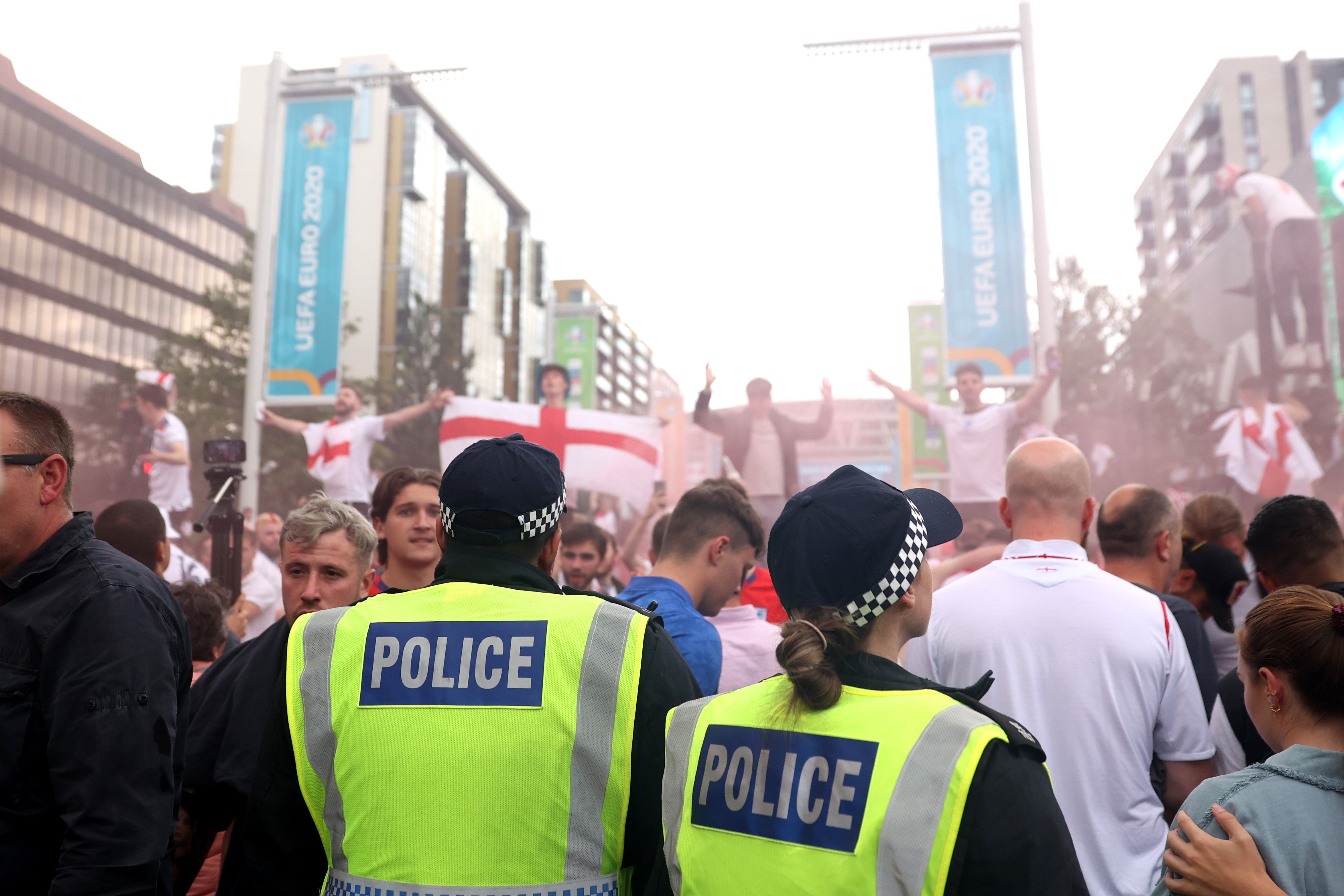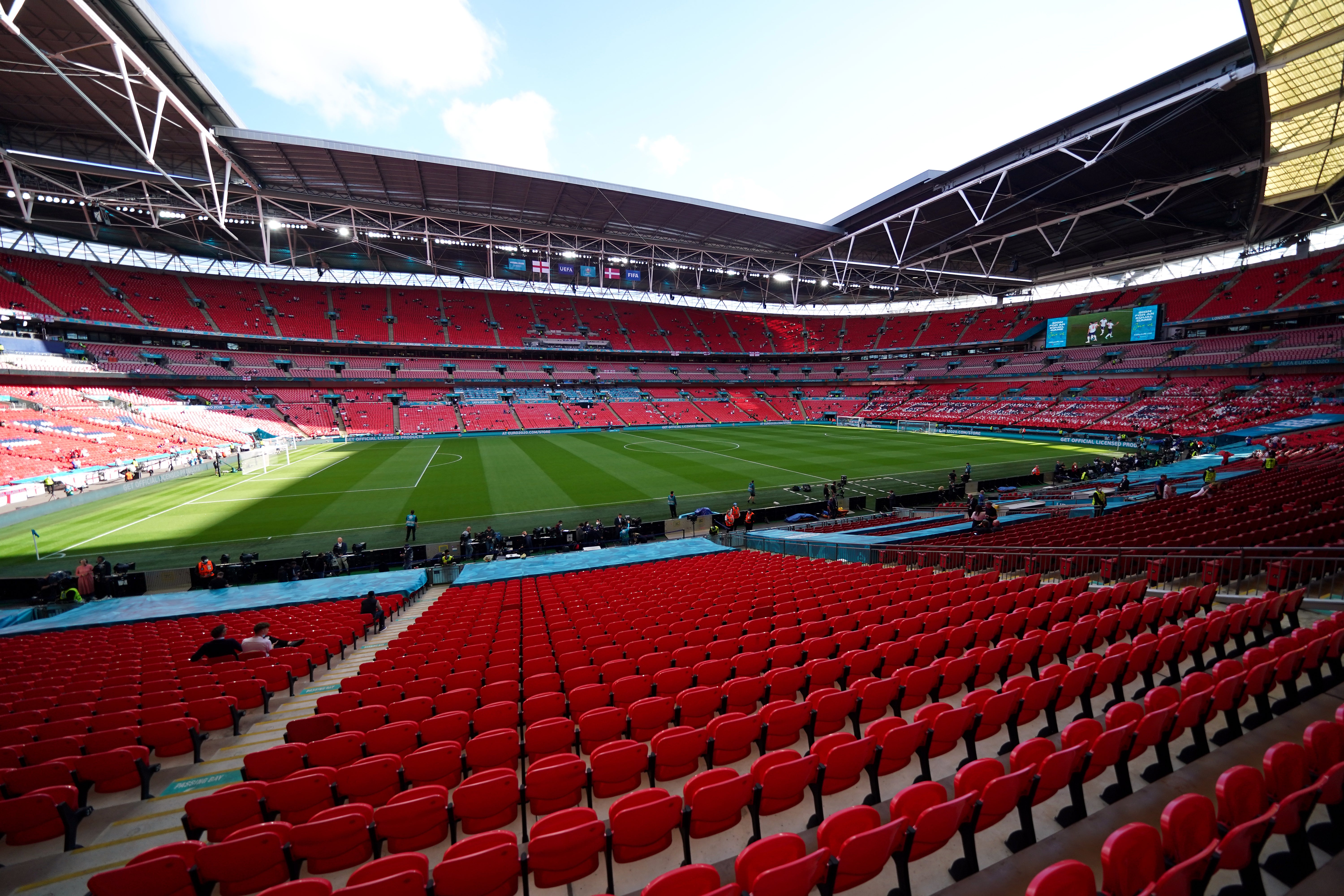Wembley must pass Carabao Cup final test with fan trouble under the microscope
Unlike the Euro 2020 final, Sunday’s showpiece between Chelsea and Liverpool should pass without trouble. Both football and wider society need it to, writes Tony Evans


The Carabao Cup final may be a minor sideshow to significant events elsewhere in the world but it is important that the Wembley showpiece between Chelsea and Liverpool goes off without a hitch. After last summer’s chaos when England lost to Italy in the Euro 2020 final, English football needs to rehabilitate its reputation.
Wembley, the FA and the Metropolitan Police will all be under scrutiny. As will the supporters of the competing clubs. Anything close to a repeat of July’s anarchy will have an adverse effect on the game in this country.
The coronavirus lockdowns meant crowds were forced to stay away from sporting events. The return of spectators was welcome but behaviour appears to have changed. There have been more violent episodes, particularly at football, than before the pandemic. Amanda Jacks, the Football Supporters’ Association caseworker who offers advice to fans who are arrested at matches, has seen her workload more than double in recent months. Although there is always a certain amount of hysteria attached to football hooliganism, it is clear that incidents are on the rise.
Even in the last week, Anthony Elanga was hit by an object thrown from the crowd when celebrating Fred’s goal in Manchester United’s 4-2 win over Leeds United at Elland Road. It is the latest in a series of players being hit by missiles hurled from the stands.
It is not just football. In boxing, Kell Brook’s victory over Amir Khan at the Manchester Arena on Saturday was marred by fighting in the crowd. Phil Foden, the Manchester City forward, was present as a spectator and was baited by a group of men. The insults became unpleasant and things turned violent as Foden’s family reacted to the abuse. Confrontational situations seem to be becoming more common.
Arrest counts back this up. Last month, the UK Football Policing Unit published figures that showed a 47 per cent rise in the six months from July compared to the same period in the previous year.
Yet some of these statistics are questionable. Supporters have recently been taken into custody for throwing toilet rolls onto the field and drinking alcohol within sight of the pitch. Cheshire Chief Constable Mark Roberts, the UK’s football policing lead, has opposed the introduction of safe standing and has repeatedly projected a negative opinion of football fans. The impression is that the game is regressing back to the 1980s. The reality is more simple: the only thing that bears comparison to the dark days four decades ago is Roberts’s views. Even with the increase in disorder, football is significantly safer and more inclusive.
Nevertheless, high-profile trouble on Sunday would harm the game. Wembley and the FA cannot afford another breakdown in their security systems.
Boris Johnson, the Prime Minister, put the onus on the ruling body, the local council and the police to ensure there will be no repeat of July this weekend. There will be a ‘no drinking’ zone and 2,000 stewards on duty. The Met’s presence will be increased and policing will be more hands-on.
It should be enough to keep a lid on any potential trouble. A senior EFL source had some qualms, though, saying “they are going over the top with stewarding but they are panicking.”
There are big differences between the Euros final and Sunday’s match. Last July, attendance was limited to 75 per cent of capacity. Those who flocked to the stadium were aware that more than 20,000 seats were empty. This, combined with the sense that it was a once-in-a-lifetime game for England, contributed to a dangerously reckless desire to break into the ground.
This was foreseeable but the authorities underestimated the threat. This will not happen at the EFL Cup final. Overkill will be the order of the day. There will be no empty seats to sneak into, either.
What is a greater concern is the mood across society. The one thing modern life has in common with the 1980s is a toxic atmosphere of confrontation. During the years of the Margaret Thatcher government there was conflict everywhere: riots in the inner cities, on picket lines during the Miners’ strike and in Northern Ireland. Ted Croker, the FA secretary, understood that football violence was a symptom rather than the disease when he faced down Thatcher after the Heysel stadium disaster in 1985. “These people are society’s problem,” he said. “We don’t want your hooligans in our sport, Prime Minister.” This is a truth that those in power do not want to hear.
Today’s schisms in civic life are largely less physical than in the 80s but the philosophical schisms surrounding Brexit, the pandemic and the increasingly bellicose discourse in politics have created a mean-spirited mood that can easily spill over into violence.
Trust in the police has rarely been so low, either. The Met, in particular, suffered severe reputational damage after Sarah Everard’s murder and a host of other scandals under the leadership of the recently deposed Cressida Dick. One officer who regularly works London games spoke on condition of anonymity. He said: “The mood has changed. Supporters are much more aggressive towards us. Before the pandemic most people would listen to us and do what we asked. Now, they are more likely to question us and not in a polite way.
“It’s not just in football. It’s got worse across the board – in cricket and rugby, too. It’s hard to rebuild trust.”
Roberts, whose default position is to promote a negative impression of supporters as untrustworthy and unruly – few of his junior colleagues on the front line at matches have positive things to say about him – points to the increased use of cocaine around sporting events. Much of what is said about drug use at football is anecdotal. There is little doubt that cocaine has infected the game but to blame narcotics for the changes in behaviour is simplistic.
The pandemic hiatus has also had an impact on football’s demographics. For some the weekly habit of matchgoing was broken. It has been suggested that this has led to an influx of younger people and more irregular attendees, who are less familiar with the accepted behaviour patterns in grounds and who are less concerned if they are threatened with exclusion from stadiums. The makeup of crowds has changed subtly.
Again, much of this information comes from feedback from regular fans rather than research. It underlines that there are no simplistic answers to the rumbling problems. The general public are more disposed to listen to the scare stories, however, than nuanced discussion.

That is evidenced by the regular pieces – even in media outlets that should know better – that reference Hillsborough and the Bradford fire when talking about “the bad old days” to which we are supposed to be backsliding. Hooliganism was not a component in either tragedy. A failure of policing, the dehumanisation of football fans and decrepit, dangerous stadiums caused these disasters. The mindset of the authorities was a key factor. Even though the grounds have changed out of all recognition, the negative preconceptions of football supporters linger.
That is why the League Cup final needs to pass off without significant issues. It is complicated by the relationship between Chelsea and Liverpool fans and the war in Ukraine. Neither set of fans likes the other. No one would be surprised if Ukrainian flags are flown in the Liverpool end. Some Chelsea supporters might feel an instinctive desire to see any criticism of Roman Abramovich and Russia as an assault on their club. Scouse diehards will boo the national anthem. Some west Londoners may take offence.
What is most likely is that the cultural and political differences between the two groups will alchemise into a splendid, raucous atmosphere. It will be lively and antagonistic in the best sense. The game will be memorable for all the right reasons.
Wembley needs this. Football needs this. The country needs this. Bigger events may be happening elsewhere but, sometimes, the smaller things tell you which way a nation is heading. It needs to be going in a different direction from the route it went down in July.






Join our commenting forum
Join thought-provoking conversations, follow other Independent readers and see their replies
Comments